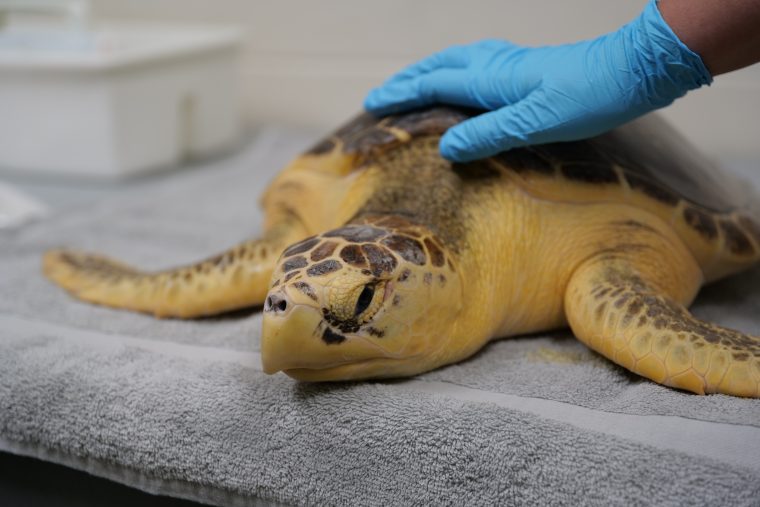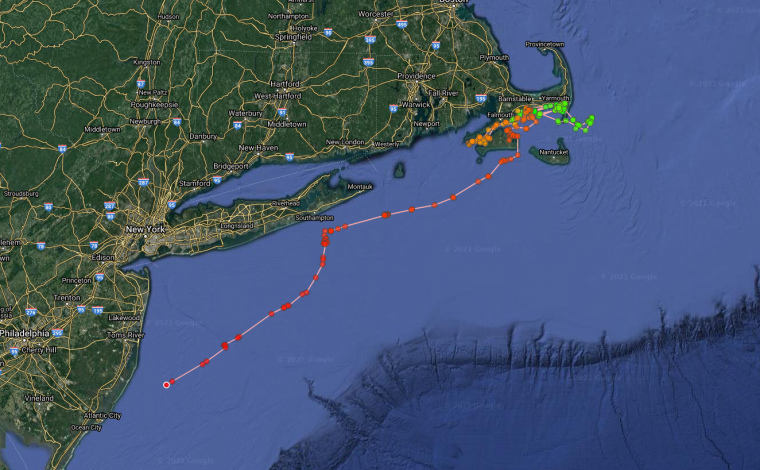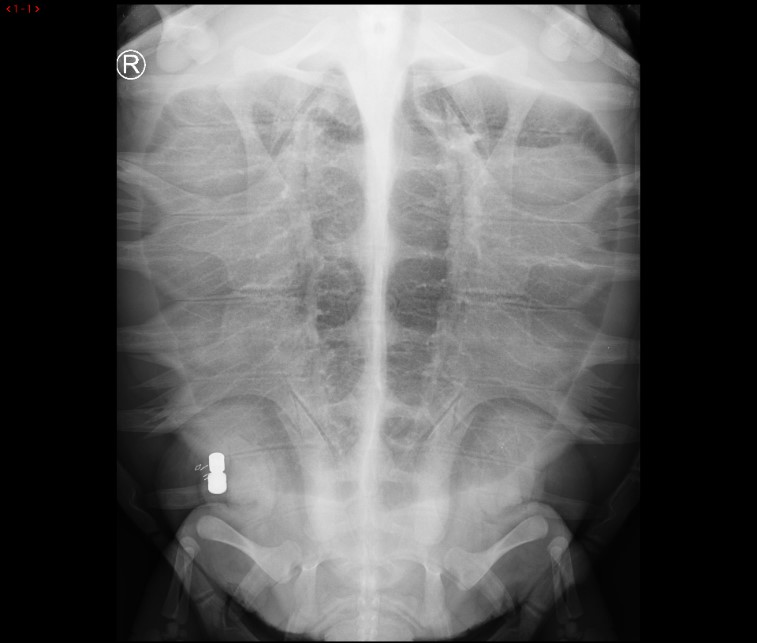Technology could revolutionize long-term monitoring of threatened sea turtles in the wild

BOSTON, MASS. (Nov. 9, 2021) – In a first-of-its-kind effort, researchers from the New England Aquarium have retrieved data from three rehabilitated sea turtles that were returned to the wild bearing surgically implanted acoustic tags. This technique could revolutionize how scientists monitor threatened and endangered turtles over long periods of time.
**PHOTOS AND VIDEO AVAILABLE HERE, WITH CREDIT TO NEW ENGLAND AQUARIUM**
Earlier this month, Aquarium scientists recovered acoustic receivers from Nantucket Sound, which showed multiple detections from three loggerhead sea turtles that were rehabilitated at the Aquarium’s Sea Turtle Hospital and released earlier this year with implanted acoustic tags. While tagging turtles is not a new concept, implanting the tag internally—versus externally on their shell using epoxy—is a pioneering method for sea turtles. The data gathered not only shows the turtles thriving in the wild but is providing researchers with valuable information on where the turtles are traveling and likely feeding.
“Tagging allows us to assess rehabilitated turtles’ survivorship over time and resumption of normal behaviors in the wild. Acoustic tags are less expensive and last longer than satellite tags, so they are an excellent choice for monitoring survival and movements of a greater number of turtles over a longer period of time, a high priority for our conservation program,” said Dr. Kara Dodge, a research scientist in the Aquarium’s Anderson Cabot Center for Ocean Life.
Acoustic tags ping listening stations like an E-ZPass system when an animal passes by. The receivers detected the loggerhead turtles nearly 100 times along the southern coast of Massachusetts between August and October. “Peanut” was detected on inshore and offshore receivers in the eastern part of Nantucket Sound, while “Captain Kool-Aid” and “Glossy Ibis” were detected on inshore receivers off Waquoit, Hyannis Harbor, and Bass River. “Glossy Ibis” has started making the trip south past Long Island, New York, based on location data from an additional satellite tag. The acoustic tags will continue to transmit data for at least three years, far longer than most traditional satellite tags, which typically become non-functional after one year. As the turtles move out of Massachusetts waters, researchers anticipate more detections from acoustic receivers along the East Coast through the Mid-Atlantic Acoustic Telemetry Observation System in the coming months and years. The research is being conducted under U.S. Fish and Wildlife Rescue permit # ES69328D.

In collaboration with Dr. Dodge and the Aquarium’s Rescue and Animal Health teams, Dr. Charles Innis, Director of Animal Health for the New England Aquarium, performed the implantation procedures. The turtles recovered well following the surgeries, and exhibited normal swimming and feeding activity.
“We are really excited with the outcome of these first few cases. We believe that this technique will allow us to better monitor the long-term fate of turtles that leave our hospital, hopefully providing evidence that they are doing well for many years to come,” Dr. Innis said.

Prior to being released, the turtles had spent seven months undergoing rehabilitative care at the Aquarium’s Sea Turtle Hospital after becoming cold-stunned and stranding on a Cape Cod beach in December 2020. Aquarium staff treated the turtles for a variety of life-threatening medical conditions, including hypothermia, pneumonia, and bone fractures.
“These loggerhead turtles required life-saving care when they first arrived to our Sea Turtle Hospital. To rehabilitate them back to full health and have them respond so well to the acoustic implants, I am encouraged to see what is next. We cannot wait to track their movements over the next few years,” said Manager of Rescue and Rehabilitation Adam Kennedy.
Over the past 13 years, scientists at the New England Aquarium have been using acoustic telemetry to monitor a range of fishes—including cod, tuna, and sharks—and gathering information about movements and survival with minimal impact to the animals. Initial results from these loggerhead turtles are a promising first step towards understanding long-term fate of rehabilitated turtles, and the potential for extended monitoring of sea turtles in the wild.
MEDIA CONTACT:
Pam Bechtold Snyder – psnyder@neaq.org, 617-686-5068
